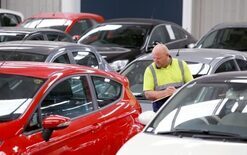Colonial predicts market ‘shakeout’

Colonial Motor Company’s chief executive says the new-vehicle market faces an “inevitable reckoning” as an influx of new brands, predominantly from China, disrupts the domestic industry.
Alex Gibbons, pictured, says the sector is facing a swarm of new entrants all with similar “value propositions” to challenge the status quo.
“They each seek dealership facilities, showroom space and to compete for customer attention,” he explains.
“It is difficult to see how a small, right-hand drive market like New Zealand can support the current levels of competition and associated market structure for an extended period of time.
“An inevitable reckoning is ahead, with brand consolidation for new and existing players the likely outcome.”
He adds in Colonial’s annual report, which has been released ahead of its annual meeting in November, that the company’s preference is to maintain strong and stable long-term relationships.
“Opening new dealerships is always a possibility, as is expanding brand representation,” he explains. “These ultimately evolve with customer preferences and manufacturers’ ability to deliver products that match customer wants and needs.
“For the present, we feel Colonial’s most prudent course is to maintain a close watching brief through observing and assessing how the market adapts and responds to these new entrants and any shakeout that follows.
“The challenge for any dealership is to maintain itself as a preferred destination for customers and to continue delivering a first-class customer experience.
“For manufacturers, more so than ever, survival now depends on navigating a complex marketplace and delivering a competitive product portfolio into the future – neither dealer nor manufacturer will succeed without the other.”
Market pivots
As announced last month, Colonial’s revenue of $1 billion for the year ended June 30, 2025, was down 1.1 per cent from the previous year’s $1.01b. Its trading profit after tax came in at $17.8 million and was 0.3 per cent less than the $17.9m in the 2024 financial year.
The company’s report notes the performance reflects pressure on vehicle margins and interest costs associated with holding inventory.
Gibbons adds the automotive market was challenging for the group’s businesses to navigate over the past financial year, which was as expected and echoed the wider state of the New Zealand economy.
Trading in the first half was subdued, particularly for new vehicles, and the rest of the year remained “patchy at best” despite areas of improvement in the second period.
“The vehicle markets in general have pivoted, from extraordinary levels of demand in the 2021 to 2023 financial years, to an oversupply of new vehicles from 2024.
“This has been compounded by an influx of new automotive brands, all vying for a slice of the New Zealand and Australian carpark.
“Given the half-year position, which was down nearly 24 per cent on the previous year, we should all be proud of the wider dealership team’s ability to achieve a strong second half. The full-year result is a respectable finish to the financial year in what was a tough vehicle retail market.”
He continues there are areas for ongoing improvement and dealership management teams throughout the year were told to invest time and energy into areas they could influence, such as inventory management, alignment of cost structures, customer service and dealership management best practice.
Car dealerships
A flat new vehicle market, along with an increasing number of brands and a variety of engine types, has resulted in a tough environment for car dealers, says Gibbons in his 2024/25 report.
“For a number of our metro dealerships, not benefitting from a recovering agricultural sector meant the last financial year has been particularly challenging.”
The document notes new vehicle registrations were only marginally ahead of the previous year, rising 1.3 per cent, but the light commercial market, a significant segment for many of Colonial’s dealers, was down 18.4 per cent.
“It is difficult to determine if the trending decline in the light commercial segment is driven by a change in customer preference, a response to the economic environment or SUVs now being seen as a more affordable choice,” he opines.
“Equally, fleet and business owners typically replace light commercial vehicles less frequently in tougher times, a practice we are well aware of in the heavy commercial sector.”
On the subject of electrification, Gibbons says the market has adapted and most segments now offer comprehensive solutions between traditional internal combustion engine (ICE) and electrified vehicles.
From an emissions perspective, he adds that customer choice has never been better and the price of EVs is less of a barrier than previously.
“The removal of the clean car discount but retention of the clean car standard, an import duty based on carbon dioxide emissions, has been a positive change in our view.
“This has removed a point of confusion while retaining a lever that is still seeking to manage vehicle emissions into the future.
“The challenge for regulators and the issue for manufacturers, who have long vehicle lead times, is how much forewarning will be given of any future policy changes.”
He also notes the government’s plans to introduce universal road user charges (RUC) from 2027 is a “logical evolution towards a ‘user pays’ approach to support transport infrastructure, but will pose a technical and administrative challenge in the short term.
Colonial has experienced sustained growth in used car volumes over the past two years, with significant growth in 2024/25.
This is attributed to the status of the economic cycle, in which a downturn generally enhances the value proposition of used vehicles relative to new, and the company’s focus to improve the resourcing, capacity and capability in this part of its business.
“The overarching goal is to create used car operations that are resilient to economic cycles and complement the new vehicle operations, so building on the strong legacy our dealerships have created in their regions,” adds Gibbons.
Property
Capital investment projects completed over the past year include the new Fagan Motors Ford and Mazda showroom in Masterton, and a “home” was also acquired for Avon City Motors in Rangiora, “a significant upgrade over the previously leased facility”.
Colonial has expanded its relationship with Mitsubishi after Manukau Autos secured the marque’s franchise in Manukau City, South Auckland.
Nelson Kia has outgrown its existing leased facility and will soon be relocating its sales and service operation to a property in Vickerman Street acquired by Colonial in 2023.
In Queenstown, previously leased land next to property owned by the group on Glenda Drive has been purchased to ensure Southern Lakes Motors can continue to operate off its existing site.
Truck and tractor dealerships
Gibbons explains the heavy truck business experienced a challenging year amid a downturn in the overall New Zealand freight market, which he labels an inevitable consequence of generally deteriorating market conditions.
“Outside of the dairy and broader agribusiness sectors, where demand remained more resilient and recovered to a degree, freight volumes fell sharply across most other industries.
“The outcome was a reduction in national heavy truck sales of 40 per cent, driven by a combination of the lower freight demand and operators extending the life of their existing fleets.
“Southpac has been navigating increased operational complexity due to ongoing model changes for both the Kenworth and DAF product lines. The Kenworth models, that are manufactured in Melbourne to customer-specific requirements, are in the process of transitioning to the Euro 6 emissions standard.
“This requires upgrades to the engine and driveline components. The Next Generation DAF is a totally new truck, resulting in a complete re-tooling of the manufacturing facility at Eindhoven in the Netherlands and Leyland in the UK.”
Additional DAF inventory was taken on to support customers through a prolonged period when trucks could not be supplied by the factory.
Gibbons says the decision to hold higher levels of inventory has come at a significant cost but it is consistent with the philosophy of supporting customers over the long term.
“The model transition to the new DAF truck is scheduled to be completed in 2026. While these model changes are essential in maintaining a competitive, modern fleet offering, the disruption has added complexity to sales, marketing and inventory planning that will continue to play out during the year ahead.”
The tractor business benefitted from increased activity in the rural sector, but a challenge for the truck and tractor industries is the “unrelenting factory price rises driven by the manufacturers’ cost increases”.
“These increases come at a time where truck and tractor operators are struggling to absorb their own added costs.
“If this price escalation continues, the risk over the medium to long term will be an opening of the door for new entrants to establish themselves in the market.”
People
As part of developing its leadership team, mostly made up of dealer principals, the company is sending a contingent of its Ford traders on a study tour in 2026 that will include attending the North American Dealer Association conference and visiting the Ford Motor Company in Detroit.
Gibbons notes that attendees will engage in training, workshops and seminars as part of a “rare and invaluable learning experience at a global level”.
Key personnel movements from the past year include Alex Delaney taking over as dealer principal from Keith Allen, who had worked within Colonial since 2005, at Fagan Motors.
Paul Shanks, a long-serving service manager, was appointed the new boss of Ruahine Motors. He replaced David Wills, who spent 32 years running dealerships and is now helping to mentor Colonial’s newer dealer principals.
Richards Burns is now at the helm of Avon City Motors in Christchurch. His appointment came after John Luxton, who has been with Colonial since 1990, stepped aside and is now working to establish the JAC brand in the South Island.
At the group office, chief financial officer Paul Stephenson is retiring at the end of 2025 after six years with the company and will be succeeded in the role by Sebastian Black, who has previously worked for Ezi Car and Armstrong’s.
“Paul’s financial skills, dedication to the task and unrelenting attention to accuracy have lifted the finance and accounting functions across the group,” says Gibbons.
Outlook
The chief executive continues that “cautious optimism” best describes the company’s outlook given the number of automotive segments it operates within.
“New Zealand appears to be facing a two-speed economic recovery between the rural and urban regions, meaning headwinds in some sectors and emerging opportunities in others.
“We expect competition to remain fierce and while optimisations and savings have already been made in some areas of the business, there is further room for improvement.
“We anticipate a gradual lift in car dealership performance as the economy improves. However, cost of living pressures, unemployment and constrained consumer confidence remain areas of concern for our metro dealers in particular.
“This is offset somewhat by a strengthening rural sector, lower interest rates and an expectation of government stimulus via the announcement of future capital projects.”
Gibbons adds the used car business remains an area of opportunity and a strategic focus, while a tough environment is predicted for its truck business, which generally lags our car dealers in the economic cycle.
“The current financial year will be a mixed bag across the various segments of the market our dealers and their various businesses operate in.
“Like the year just been, success ultimately depends on identifying the pockets of opportunity alongside the individual dealership teams’ abilities to adapt to change and to take the opportunities available to them.”





